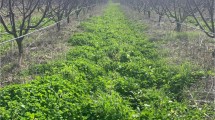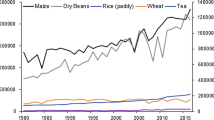Abstract
Arabica coffee production provides a livelihood to millions of people worldwide. Climate change impact studies consistently project a drastic decrease of Arabica yields in current production regions by 2050. However, none of these studies incorporated the beneficial effects that elevated CO2 concentrations are found to have on Arabica coffee yields, the so-called CO2 fertilization effect. To assess the impacts of climate change and elevated CO2 concentrations on the cultivation of Arabica coffee in Brazil, a coffee yield simulation model was extended with a CO2 fertilization and irrigation factor. The model was calibrated and validated with yield data from 1989 to 2013 of 42 municipalities in Brazil and found to perform satisfactorily in both the calibration (R 2 = 0.91, d = 0.96, mean absolute percentage error (MAPE) = 8.58%) and validation phases (R 2 = 0.96, d = 0.95, MAPE = 11.16%). The model was run for the 42 municipalities from 1980 to 2010 with interpolated climate data and from 2040 to 2070 with climate data projected by five global circulation models according to the Representative Concentration Pathway 4.5 scenario. The model projects that yield losses due to high air temperatures and water deficit will increase, while losses due to frost will decrease. Nevertheless, extra losses are offset by the CO2 fertilization effect, resulting in a small net increase of the average Brazilian Arabica coffee yield of 0.8% to 1.48 t ha−1 in 2040–2070, assuming growing locations and irrigation remain unchanged. Simulations further indicate that future yields can reach up to 1.81 t ha−1 provided that irrigation use is expanded.


Similar content being viewed by others
References
Agência Nacional de Águas (2014) Levantamento da agricultura irrigada por pivôs centrais no Brasil - 2014. Brasília (FD). Available at: http://arquivos.ana.gov.br/imprensa/arquivos/ProjetoPivos.pdf
Alvares CA et al (2013) Köppen’s climate classification map for Brazil. Meteorol Z 22(6):711–728. https://doi.org/10.1127/0941-2948/2013/0507
Assad ED et al (2004) Climatic changes impact in agroclimatic zonning of coffee in Brazil. Pesq Agrop Brasileira 39(11):1057–1064. https://doi.org/10.1590/S0100-204X2004001100001
Bunn C et al (2015) A bitter cup: climate change profile of global production of Arabica and Robusta coffee. Clim Chang 129(1–2):89–101. https://doi.org/10.1007/s10584-014-1306-x
Butt MS, Sultan MT (2011) Coffee and its consumption: benefits and risks. Crit Rev Sci Nutr 51(4):363–373. https://doi.org/10.1080/10408390903586412
Camargo MBP (2010) The impact of climatic variability and climate change on Arabic coffee crop in Brazil. Bragantia 69:239–247. https://doi.org/10.1590/S0006-87052010000100030
Camargo AP, Sentelhas PC (1997) Performance evaluation of different potential evapotranspiration estimating methods in the state of São Paulo, Brazil, Revista Brasileira de Agrometeorologia, p 89–97. Available at: http://www.leb.esalq.usp.br/agmfacil/artigos/artigos_sentelhas_1997/1997_RBAgro_5(1)_89-97_ETPM%E9todosSP.pdf
Camargo MBP et al (2005) Test of an agrometeorological model for monitoring and predicting coffee yield in São Paulo state, Brazil. Embrapa Café. Available at: https://www.embrapa.br/busca-de-publicacoes/-/publicacao/909323/teste-de-modelo-agrometeorologico-de-monitoramento-e-de-estimativa-de-produtividade-do-cafeeiro-coffea-arabica-l-no-estado-de-sao-paulo
Cardenas RR (2015) Climate change assessment for Minas Gerais—Brazil with emphasis on coffee areas, Produced for the Initiative for Coffee & Climate. Hamburg. Available at: http://www.coffeeandclimate.org/reports_studies.html?file=tl_files/CoffeeAndClimate/downloads/Climate change assessment for MG Brazil_climate projections_Part 2.pdf
Chemura A et al (2016) Bioclimatic modelling of current and projected climatic suitability of coffee (Coffea arabica) production in Zimbabwe. Reg Environ Chang. Springer Berlin Heidelberg 16(2):473–485. https://doi.org/10.1007/s10113-015-0762-9
CIAT (2010) Climate change adaptation and mitigation in the Kenyan coffee sector. Cali. Available at: http://dapa.ciat.cgiar.org/wp-content/uploads/2010/03/kenyan-coffee-sector.pdf
Climate Action Tracker (2016) Paris Agreement in force, but no increase in climate action. Available at: http://climateactiontracker.org/assets/publications/briefing_papers/CAT_temperature_update_November_2016.pdf
Craparo ACW et al (2015) Coffea arabica yields decline in Tanzania due to climate change: global implications. Agric For Meteorol 207:1–10. https://doi.org/10.1016/j.agrformet.2015.03.005
DaMatta FM et al (2016) Sustained enhancement of photosynthesis in coffee trees grown under free-air CO2 enrichment conditions: disentangling the contributions of stomatal, mesophyll, and biochemical limitations. J Exp Bot 67(1):341–352. https://doi.org/10.1093/jxb/erv463
Easterling WE et al (2007) Food, fibre and forest products. In: Climate change 2007: impacts, adaptation and vulnerability. Contribution of Working Group II to the Fourth Assessment Report of the Intergovernmental Panel on Climate Change, p 273–313. Available at: http://gala.gre.ac.uk/2359/
Eitzinger A et al (2013) Prediction of the impact of climate change on coffee and mango growing areas in Haiti, Full Technical Report. Centro Internacional de Agricultura Tropical (CIAT). Available at: http://hdl.handle.net/10568/56976
Estrada F, Gay C, Conde C (2012) A methodology for the risk assessment of climate variability and change under uncertainty. A case study: coffee production in Veracruz, Mexico. Clim Chang 113(2):455–479. https://doi.org/10.1007/s10584-011-0353-9
Fain SJ et al (2017) Climate change and coffee: assessing vulnerability by modeling future climate suitability in the Caribbean island of Puerto Rico. Clim Chang 1–12. https://doi.org/10.1007/s10584-017-1949-5
Ghini R et al (2011) Incubation period of Hemileia vastatrix in coffee plants in Brazil simulated under climate change. Summa Phytopathol 37(2):85–93. https://doi.org/10.1590/S0100-54052011000200001
Ghini R et al (2015) Coffee growth, pest and yield responses to free-air CO2 enrichment. Clim Chang 132(2):307–320. https://doi.org/10.1007/s10584-015-1422-2
Gulizia C, Camilloni I (2015) Comparative analysis of the ability of a set of CMIP3 and CMIP5 global climate models to represent precipitation in South America. Int J Climatol 35(4):583–595. https://doi.org/10.1002/joc.4005
Hudson N, Ruane A (2013) AgMIP climate scenario generation tools with R. Available at: http://tools.agmip.org/acsgtr.php
IBGE (2006) Censo Agropecuário: Tabela 1819 - Número de estabelecimentos agropecuários com uso de irrigação e Área dos estabelecimentos por método utilizado para irrigação e grupos e classes de atividade. Available at: https://sidra.ibge.gov.br/tabela/1819
IBGE (2016) Produção Agrícola Municipal: Tabela 1613 - Área destinada à colheita, área colhida, quantidade produzida, rendimento médio e valor da produção das lavouras permanentes. Available at: https://sidra.ibge.gov.br/tabela/1613#notas-tabela
Jaramillo J et al (2011) Some like it hot: the influence and implications of climate change on coffee berry borer (Hypothenemus hampei) and coffee production in East Africa. PLoS ONE 6(9). https://doi.org/10.1371/journal.pone.0024528
Jassogne L, Läderach P, Van Asten P (2013) The impact of climate change on coffee in Uganda. Lessons from a case study in the Rwenzori Mountains. Available at: https://www.oxfam.de/system/files/rr-impact-climate-change-coffee-uganda-030413-en.pdf
Laderach P et al (2017) Climate change adaptation of coffee production in space and time. Clim Chang 141(1):47–62. https://doi.org/10.1007/s10584-016-1788-9
Lobell DB et al (2008) Irrigation cooling effect on temperature and heat index extremes. Geophys Res Lett 35(9):1–5. https://doi.org/10.1029/2008GL034145
Marengo JA, Tomasella J, Nobre CA (2017) Waters of Brazil. p 171–191. https://doi.org/10.1007/978-3-319-41372-3
Martins MQ et al (2016) Protective response mechanisms to heat stress in interaction with high [CO2] conditions in coffea spp. Front Plant Sci 7(2016):1–18. https://doi.org/10.3389/fpls.2016.00947
Moreira MA et al (2010) Geotechnologies to map coffee fields in the states of Minas Gerais and São Paulo. Eng Agríc 30:1123–1135. https://doi.org/10.1590/S0100-69162010000600013
Ovalle-Rivera O et al (2015) Projected shifts in Coffea arabica suitability among major global producing regions due to climate change. PLoS One 10(4):1–13. https://doi.org/10.1371/journal.pone.0124155
Paulino J et al (2011) Brazil agriculture irrigated status according to the agricultural census of 2006. Irriga 16(2):163–176. 10.15809/irriga.2011v16n2p163
Picini AG et al (1999) Test and analysis of agrometeorological models for predicting coffee yield. Bragantia 58(1):157–170. https://doi.org/10.1590/S0006-87051999000100015
Porter JR et al (2014) Food security and food production systems. In: climate change 2014: impacts, adaptation, and vulnerability. Part A: global and sectoral aspects. Contribution of Working Group II to the Fifth Assessment Report of the Intergovernmental Panel on Climate Change. p 485–533. https://doi.org/10.1111/j.1728-4457.2009.00312.x
Rodrigues WP et al (2016) Long-term elevated air [CO2] strengthens photosynthetic functioning and mitigates the impact of supra-optimal temperatures in tropical Coffea arabica and C. canephora species. Glob Chang Biol 22(1):415–431. https://doi.org/10.1111/gcb.13088
Sachs J et al (2015) The impacts of climate change on coffee: trouble brewing. New York. Available at: http://eicoffee.net/files/report/main.pdf
Sanford T et al (2014) The climate policy narrative for a dangerously warming world. Nat Clim Chang. Nature Publishing Group 4(3):164–166. https://doi.org/10.1038/nclimate2148
Santos MA (2005) Calibration of sensitivity coefficients and test of a agrometeorological model for predicting coffee (Coffea arabica L.). Available at: http://www.iac.sp.gov.br/areadoinstituto/posgraduacao/dissertacoes/pb1805803.pdf
Santos MA et al (2006) Parametrização de modelo agrometeorológico de estimativa de produtividade do cafeeiro (Coffea Arabica L.) para diferentes escalas: planta, talhão, propriedade e município. Bragantia 65(1) Available at: http://www.sbicafe.ufv.br/bitstream/handle/123456789/2024/166733_Art042f.pdf?sequence=1&isAllowed=y
Schroth G et al (2014) Winner or loser of climate change? A modeling study of current and future climatic suitability of Arabica coffee in Indonesia. Reg Environ Chang 15(7):1473–1482. https://doi.org/10.1007/s10113-014-0713-x
Silveira CS et al (2013) Performance assessment of CMIP5 models concerning the representation of precipitation variation patterns in the twentieth century on the northeast of Brazil, Amazon and Prata Basin and analysis of projections for the scenery RCP8.5. Rev Bras Meteorol 28(3):317–330. https://doi.org/10.1590/S0102-77862013000300008
Steiner JL, Kanemasu ET, Hasza D (1983) Microclimatic and crop responses to center pivot sprinkler and to surface irrigation. Irrig Sci 4:201–214. https://doi.org/10.1007/BF00285526
Thornthwaite CW (1948) An approach toward a rational classification of climate. Geogr Rev 38:55–916
Thornthwaite CW, Mather JR (1955) The water balance. Climatology 4(1)
Urrego-Pereira Y et al (2013) Microclimatic and physiological changes under a center pivot system irrigating maize. Agric Water Manag 119(September 2016):19–31. https://doi.org/10.1016/j.agwat.2012.12.013
van Vuuren DP et al (2011) The representative concentration pathways: an overview. Clim Chang 109(1):5–31. https://doi.org/10.1007/s10584-011-0148-z
Willmott CJ et al (1985) Statistics for the evaluation and comparison of models. J Geophys Res 90(C5):8995–9005. https://doi.org/10.1029/JC090iC05p08995
Xavier AC, King CW, Scanlon BR (2015) Daily gridded meteorological variables in Brazil (1980-2013). Int J Climatol 2659:2644–2659. https://doi.org/10.1002/joc.4518
Yin L et al (2013) How well can CMIP5 simulate precipitation and its controlling processes over tropical South America? Clim Dyn 41(11–12):3127–3143. https://doi.org/10.1007/s00382-012-1582-y
Zacharias O et al (2008) Agrometeorological model for estimating the beginning of the flowering period for coffee crop (Coffea arabica L.) Bragantia 67(1):249–256 Available at: http://www.redalyc.org/articulo.oa?id=90867130
Zullo J et al (2011) Potential for growing Arabica coffee in the extreme south of Brazil in a warmer world. Clim Chang 109(3–4):535–548. https://doi.org/10.1007/s10584-011-0058-0
Author information
Authors and Affiliations
Corresponding author
Rights and permissions
About this article
Cite this article
Verhage, F.Y.F., Anten, N.P.R. & Sentelhas, P.C. Carbon dioxide fertilization offsets negative impacts of climate change on Arabica coffee yield in Brazil. Climatic Change 144, 671–685 (2017). https://doi.org/10.1007/s10584-017-2068-z
Received:
Accepted:
Published:
Issue Date:
DOI: https://doi.org/10.1007/s10584-017-2068-z




